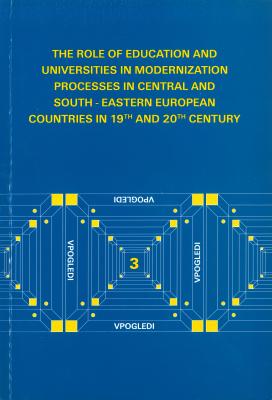The Role of Education and Universities in Modernization Processes in Central and South-Eastern European Countries in 19th and 20th Century
Keywords:
education, social role, universities, Central Europe, Southeast EuropeSynopsis
For some time, the researchers studying various aspects of social and economic development in the 19th and 20th century have been pointing at the crucial role of education, schooling system and high-education institutions in the processes of social and economic modernisation and political and social democratisation. These processes could not take place without the spread of literacy, professionalization and communication using written language and media; and neither without the formation of educated and business elites, which became an indispensable dynamic factor of social, economic and cultural changes. In particular in the countries and nations with only weak urban middleclass population and slow development of non-agrarian economy (small trades and industry), educational institutions and universities were one of the most important factors of social mobility and transformation, which paved the way for the emergence of urbanized middle-class population and modern social and economic flows. In the 19th century, a large part of higher-education and university students were schooled outside their home environment; until 1918 students in the Habsburg monarchy were mostly schooled at the university centres within the monarchy, whereas the students from the South-Eastern European countries attended also Western European universities. Afterwards, they all conveyed their knowledge and economic, social and political development views to the local and wider national environment. With gradual establishing of higher-education and university institutions in the environments and countries where they had not existed before, new scientific and university centres started to emerge in Central and South-Eastern Europe in the second half of the 19th century; they accelerated the formation of educated elites and encouraged their modernisation efforts.
Chapters
-
Introduction
-
Universities and Societal Change in Central and South-Eastern European Countries - Yesterday - Today - Tomorrow
-
Education and Universities in the Modernization and Europeanization Processes in South-Eastern EuropeSome Reflections on Interpretation and Methodology
-
The Role of Education in Modernizing Croatia in the 2nd Half of the 19th Century
-
High School, University of Belgrade and Modernization of Serbia (1863-1914)
-
Emancipation through EducationSome Bulgarian Experience since the 19th Century
-
Educated Elites in Slovene Regions before VVWI - between National Aspirations and Social and Political Conservativism
-
Thinking Big in Vienna: Balkan Students Inventing Yugoslavia before WWI
-
The Creation of Higher Technical and Vocational Schools in Cisleithania in the last Decades of the 19th Century (with special regard to the South-Slav Lands).An Instrument for Modernizing the Austrian Educational System ?
-
Education and Economic Development in Slovenia (Some Observations up to WWII)
-
Der Zugang zu den Hochschulstudien im alten Österreich
-
University Education: A Shortcut to Modernity or a Blind Alee? Student Political Activism as an Agent of Modernization
-
From Gender Segregation to Gender Equality in the School System
-
Towards Educational Typology of Slovene Industrial Entrepreneurs
-
Acceptance of Modern Scientific Achievements in Slovene Communication NetworkExample of Evolution Theory and Formation Process of Slovene Technical Terminology

Published
Series
Print ISSN
License

This work is licensed under a Creative Commons Attribution-NonCommercial-NoDerivatives 4.0 International License.

